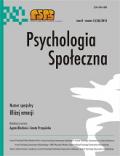Dyfuzyjny wpływ emocji (automatycznych vs. refleksyjnych) na formułowanie sądów
Diffusiveness of emotions (of automatic vs. reflective origin) as bases of judgments
Author(s): Kamil K. Imbir, Maria JarymowiczSubject(s): Psychology
Published by: Wydawnictwo Naukowe Scholar Sp. z o.o.
Keywords: primary vs. secondary affect; evaluative diffusiveness; affective priming paradigm
Summary/Abstract: Studies indicate that emotions can have a diffusive influence on information processing – on relevant as well as on irrelevant attributes of a given context. The authors assume that such influence does not concern all types of emotions. They refer to a taxonomy of human emotions (Jarymowicz & Imbir, 2010) – distinguishing two types of emotions of different origin: the automatic emotions (based on primary affects prior to an explicit recognition) vs. the reflective emotions (due to a stimuli recognition, appraisal and secondary affects). According to the main assumption, only automatic emotions are diffusive. The reflective emotions are specifically connected with recognized aspects of reality and as such have no global impact on the whole context. This assumption is coherent with the results of the authors’ studies showing that the level of performance of the Stroop Test and the Antisaccade Test was lower in condition of the automatic emotions elicitation than in condition of the reflective emotion elicitation as well as in control condition. The article presents a new study – with the subliminal affective priming paradigm application. As subliminal primes words related to the automatic vs. reflective emotions (like disgust and pride) were used for 32 msec. Japanese signs served as neutral targets. Data show the effect (more negative appraisals of neutral targets after negative than after positive primes) exclusively for words related to the automatic emotions, and no effect for the reflective category of words
Journal: Psychologia Społeczna
- Issue Year: VIII/2013
- Issue No: 26
- Page Range: 251-261
- Page Count: 11
- Language: Polish

